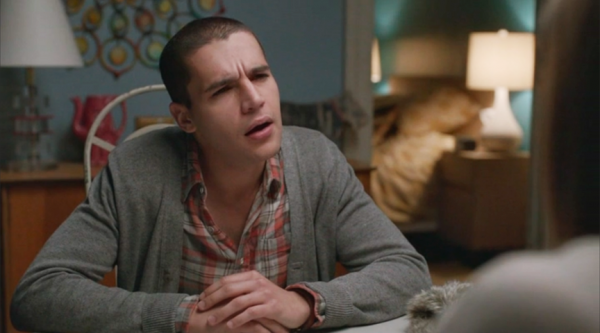The Lost Boys of Girls
How HBO's hit reflects a strange new world of male-female relations.

By Judy Batalion
With admiration, contempt, or both, everyone talks about the girls of Girls, which returns for its second season on HBO this Sunday. But what about the boys? Girls explicitly calls back to Sex and the City early on. But unlike that show — unlike possibly anything written for TV about women, ever — Girls's gender dynamics aren't about "will he call" but "how do I get rid of him?" When will Marnie finally shake the attentions of clingy Charlie and hook up with the hot artist? How will Hannah literally push Adam away from her so she can get some sleep? These are not unable-to-commit guys, but super-attached ones, who idolize the women. A generation after Mr. Big, the guys of Girls are way too into you.
The show premiered a few months before the publication of Hanna Rosin's book The End of Men: and The Rise of Women, in which the author argues that the 2,000-year patriarchy is basically over. We are in transition, Rosin explains. Women are increasingly independent to the point that, in some circles, men seem unnecessary, even burdensome, especially now that many are unemployed. In the show, all of this might be summed up in the scene where Ray physically chases Shoshanna through Bushwick. When he finally catches her, she socks him in the balls.
That moment more or less captures the gender dynamics of Girls. Marnie is stuck with her clingy college boyfriend, Charlie, despite the fact that "his touch feels like a weird uncle." She flirts with artists while Charlie showers her with compliments and attention. He says "make love," she says "fuck." When they briefly reconcile, he pleads, "Don't make me feel safe and then abandon me." Even once he has a new girlfriend, he comes onto to Marnie, pretending it's a joke when she rebuffs him. Marnie is repulsed by his attachment. She doesn't even know where he lives — four years of dating and she's never seen his apartment.
As for Jessa, though she's involved with many men, she doesn't seem particularly interested in any of them. At the beginning of the show, she's pregnant, and we have no idea by whom — it's not even discussed. A guy she fucks in a bar (who borrows her phone so he can call his mom) is a distraction from her abortion. Jeff the dad is fun for a minute — and then deeply unfun when he begins to cry on her lap and beg her to spend the night with him.
Even adorable Shoshanna's desires are not really for a guy. She doesn't want a particular man; she wants to lose her viriginity. Ray, with his keen interest in her, looks like a good way to accomplish this, but she warns him outright to "stay out of my emotional way."
There's one seeming exception to the rule: Hannah's relationship with Adam, which at first seems to echo SATC's "will he call?" dynamic. The show's first mention of Adam is Hannah complaining that he hasn't texted her back. But the relationship soon changes dramatically. Once Adam commits, he commits with a vengeance. The next time we see them, he's nestled in her bed, showing her images of his childhood; he opens up about his writing, teaches her to jog, and offers to move in with her. Hannah is petrified. As Rosin (who briefly mentions the show in her book) points out, Hannah's real drama is whether she will become a writer. She dates for the story. Adam, distraught over her inability to commit, gets wheeled away on a stretcher.
These men all want love. They are easily attached. Women make them feel secure, young, valuable. They are soft, yielding, and compromising. They listen. And my immediate reaction (like James Franco's!) was to think of them as losers.
But a part of me also really liked these guys. In fact, I started to realize, I wanted to hang out with them. They are smart, emotionally. They are not pathetically worrying about preserving their masculinity, unable to utter the word "feeling." They care about their relationships. Charlie in particular has a keen understanding of intimacy. It's he who initiates the break with Marnie, because he realizes she isn't in love with him. He has a developed sense of adult commitment. ("I decided on you!") Even his plea about abandonment suggests wisdom and self-knowledge.
Adam too, once a boyfriend, is an utterly reliable one. He's honest with Hannah from the start, open about his emotional states, clear about their dynamics, and even full of good advice for her ("don't waste time on guilt... holding on to toxic relationships is what keeps us from growing"). He's right in telling Hannah off for her self-absorption. And he's not at all distanced or ironic about his adoration. ("I was doing it because I love you," he says, about his offer to move in with Hannah. "I didn't think you were into that," Hannah replies, surprised. Adam is now surprised. "Into what? Love?")
These men are frank, sincere, in tune with themselves and with their partners. They're loving, accepting, and self-aware. They admit hurt and defeat. The women are all about ambition, achievement, career goals, insecurity, and self-discovery, while masculinity is the space of commitment, honesty, and need.
Rosin argues that while women have changed dramatically in the past few decades, men have been much less flexible. It dawned on me that my own ambivalent reaction to these Girls men (albeit as an ancient thirty-five-year-old whose early twenties were marked by SATC and The Rules) might be part of a problem. Maybe women want "softer" men to exist in theory, but not (yet?) in actuality. Are women not letting men change? Are we rejecting the Charlies of the world prematurely?
Girls seems to be all about the ambivalence and ambiguity of this transitional moment. I'm excited to see what Season 2 brings for its leading men — even if "leading" is, suddenly, a bit of a misnomer.
Want to meet a secretly sensitive woodworker/actor? Meet them on Hooksexup.











Commentarium
comments powered by Disqus